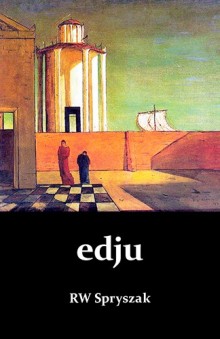The Surrealism of War, Politics, Religion and Everything Else
By Larissa Shmailo
RW Spryszak;s Edju is a compelling, thought-provoking read, possibly one of the best antiwar novels since Dalton Trumbo’s Johnny Got His Gun. Its eponymous unreliable narrator is certainly as odd as Trumbo’s and every bit as opinionated. Edju’s point of view is skewed, we suspect, but the surreal world he encounters is undeniably more so. Populated by fantastic saints, monstrous war machines, and fatalistic animate metaphors of death, the world of Edju threatens us with the core horror of humans systematically killing one another for questionable ideas.
Reading Edju, I saw elements of the original picaresque novel in the adventures of its Quixotic, but always truthful, protagonist. But his story—a hagiography, perhaps, if Edju’s time-warping memory serves— is a continuing exercise in excess, an attempt to trump absurdist and surrealist writing of past several centuries. There are loud shout outs to Gogol’s nose and Kharm’s corpses, and more than a few scenes that are reminiscent of Kafka and even an absurdist Robinson Crusoe.
All of this is done in a slow reveal—we learn the name of the narrator, an old man mocked by children only in the eighth chapter. We assume Edju is mad, hopelessly odd, a compulsive-obsessive religious fanatic, a kook who thinks his dead lover is strangely and selectively alive in a sack. As his Nordic world unfolds in subsequent chapters, we come to believe this limited being is the only sane man on his dystopic nation.
The central conceits of the novel, Edju’s windmills, are surreal metaphors for war and competition in reduction ad absurdem: war machines fueled by human bodies, a Mountain of Flesh all are eager to climb, factions absurdly fighting over table cloths which have become their last banners, a Maze of defense. The path to war is depicted accurately, starting with pamphlets and the rise of fascism and inevitably followed by
Leftist Agrarian Front. Rightist National Unity. Holy Orders of the Fist of God. The Liberal Party. The Conservative Party. Liberal Conservatives and Conservative Liberals. The Armed Hand of the Nation. Nuns. All armed. All vying for power
And:
Évitez les faux, they shouted. Libérez nos bébés, they called. N’accepte pas les substituts. It seemed like a full-scale rebellion was at hand. I had no idea if those phrases were in any way grammatical and correct. But in times of revolution even the commas get misplaced.
Religion fares no better than politics. In nomenclature reminiscent of David Foster Wallace’s Year of the Depends Undergarment, faith in Edju’s universe is represented by Bibliana, saint of headaches and hangovers, Our Lady That Didn’t Tumble, Saint Fomildehyde, and extremely peculiar paths to canonization.
The writing of Edju is synaesthetic and witty, replete with eyepopping detail, zinger similes, and wise one liners:
Death makes everyone an outcast.
.
There was a tan gray moon, a pure slice of venom in the blood, floating overhead.
Climbing up the embankment was a struggle, but her perfume reached out like a muscular ghost that held me close to its face of vapors. As wrong as elephants.
Left to the devices of nature all things decay. Why is this not the basis of the theory of everything they search for?
The rain fell so hard it opened graves.
.
If you are not them, you are the other. It’s in the Constitution now.
Firing a gun is like fucking a ghost.
.
RW Spryszak’s unusual hero’s journey belongs on your reading list. Like many fine works that eptly mine and mime our culture, it is novel, in the first meaning of the word.
You can find the book here:

No comments:
Post a Comment